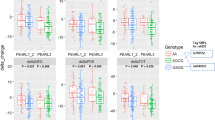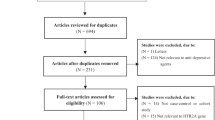Abstract
Variation in genes involved in serotonergic signaling is thought to be associated with antidepressant treatment response in generalized anxiety disorder (GAD). We examined a possible interaction between the serotonin transporter gene (SLC6A4) 5-HTTLPR/rs25531 haplotype and the serotonin 2A receptor gene (HTR2A) single-nucleotide polymorphism (SNP) rs7997012 in antidepressant treatment outcome in GAD. Patients diagnosed with GAD received venlafaxine XR treatment as part of an 18-month relapse prevention study. Genotypes obtained for the 5-HTTLPR/rs25531 (La/La, La/S or S/S) haplotype and rs7997012 SNP (G or A) in the European American population (n=112) were used for pharmacogenetic analysis. Our data show that subjects with genotypes La/La+G/G or La/La+G/A (n=28) had significantly lower Hamilton Anxiety Scale (HAM-A) scores than those with genotypes La/S+A/A or S/S+A/A (n=12) at 6 months (HAM-A difference=10.7; P<0.0001). Single-marker analysis only showed HAM-A differences of 4.3 (5-HTTLPR/rs25531: La/La versus La/S+S/S) and 4.8 (rs7997012: G/G+G/A versus A/A), showing for the first time a significant gene–gene interaction between these markers.
This is a preview of subscription content, access via your institution
Access options
Subscribe to this journal
Receive 6 print issues and online access
$259.00 per year
only $43.17 per issue
Buy this article
- Purchase on Springer Link
- Instant access to full article PDF
Prices may be subject to local taxes which are calculated during checkout


Similar content being viewed by others
References
Baldwin DS, Nair RV . Escitalopram in the treatment of generalized anxiety disorder. Expert Rev Neurother 2005; 5: 443–449.
Gelenberg AJ, Lydiard RB, Rudolph RL, Aguiar L, Haskins JT, Salinas E . Efficacy of venlafaxine extended-release capsules in nondepressed outpatients with generalized anxiety disorder: a 6-month randomized controlled trial. JAMA 2000; 283: 3082–3088.
Rickels K, Downing R, Schweizer E, Hassman H . Antidepressants for the treatment of generalized anxiety disorder. A placebo-controlled comparison of imipramine, trazodone, and diazepam. Arch Gen Psychiatry 1993; 50: 884–895.
Rickels K, Rynn M . Pharmacotherapy of generalized anxiety disorder. J Clin Psychiatry 2002; 63 (Suppl 14): 9–16.
Rickels K, Rynn M, Iyengar M, Duff D . Remission of generalized anxiety disorder: a review of the paroxetine clinical trials database. J Clin Psychiatry 2006; 67: 41–47.
Andrews G, Sanderson K, Slade T, Issakidis C . Why does the burden of disease persist? Relating the burden of anxiety and depression to effectiveness of treatment. Bull World Health Organ 2000; 78: 446–454.
Pollack MH . Refractory generalized anxiety disorder. J Clin Psychiatry 2009; 70 (Suppl 2): 32–38.
Kato M, Serretti A . Review and meta-analysis of antidepressant pharmacogenetic findings in major depressive disorder. Mol Psychiatry 2010; 15: 473–500.
Tiwari AK, Souza RP, Muller DJ . Pharmacogenetics of anxiolytic drugs. J Neural Transm 2009; 116: 667–677.
Narasimhan S, Lohoff FW . Pharmacogenetics of antidepressant drugs: current clinical practice and future directions. Pharmacogenomics 2012; 13: 441–464.
Serretti A, Artioli P, Quartesan R . Pharmacogenetics in the treatment of depression: pharmacodynamic studies. Pharmacogenet Genomics 2005; 15: 61–67.
Lesch KP, Bengel D, Heils A, Sabol SZ, Greenberg BD, Petri S et al. Association of anxiety-related traits with a polymorphism in the serotonin transporter gene regulatory region. Science 1996; 274: 1527–1531.
Heils A, Teufel A, Petri S, Stober G, Riederer P, Bengel D et al. Allelic variation of human serotonin transporter gene expression. J Neurochem 1996; 66: 2621–2624.
Heinz A, Jones DW, Mazzanti C, Goldman D, Ragan P, Hommer D et al. A relationship between serotonin transporter genotype and in vivo protein expression and alcohol neurotoxicity. Biol Psychiatry 2000; 47: 643–649.
Hu XZ, Lipsky RH, Zhu G, Akhtar LA, Taubman J, Greenberg BD et al. Serotonin transporter promoter gain-of-function genotypes are linked to obsessive-compulsive disorder. Am J Hum Genet 2006; 78: 815–826.
Lotrich FE, Pollock BG, Ferrell RE . Polymorphism of the serotonin transporter: implications for the use of selective serotonin reuptake inhibitors. Am J Pharmacogenomics 2001; 1: 153–164.
Serretti A, Kato M, De Ronchi D, Kinoshita T . Meta-analysis of serotonin transporter gene promoter polymorphism (5-HTTLPR) association with selective serotonin reuptake inhibitor efficacy in depressed patients. Mol Psychiatry 2007; 12: 247–257.
Taylor MJ, Sen S, Bhagwagar Z . Antidepressant response and the serotonin transporter gene-linked polymorphic region. Biol Psychiatry 2010; 68: 536–543.
Kraft JB, Slager SL, McGrath PJ, Hamilton SP . Sequence analysis of the serotonin transporter and associations with antidepressant response. Biol Psychiatry 2005; 58: 374–381.
Billett EA, Richter MA, King N, Heils A, Lesch KP, Kennedy JL . Obsessive compulsive disorder, response to serotonin reuptake inhibitors and the serotonin transporter gene. Mol Psychiatry 1997; 2: 403–406.
Perna G, Favaron E, Di Bella D, Bussi R, Bellodi L . Antipanic efficacy of paroxetine and polymorphism within the promoter of the serotonin transporter gene. Neuropsychopharmacology 2005; 30: 2230–2235.
Stein MB, Seedat S, Gelernter J . Serotonin transporter gene promoter polymorphism predicts SSRI response in generalized social anxiety disorder. Psychopharmacology 2006; 187: 68–72.
Lenze EJ, Goate AM, Nowotny P, Dixon D, Shi P, Bies RR et al. Relation of serotonin transporter genetic variation to efficacy of escitalopram for generalized anxiety disorder in older adults. J Clin Psychopharmacol 2010; 30: 672–677.
McMahon FJ, Buervenich S, Charney D, Lipsky R, Rush AJ, Wilson AF et al. Variation in the gene encoding the serotonin 2A receptor is associated with outcome of antidepressant treatment. Am J Hum Genet 2006; 78: 804–814.
Peters EJ, Slager SL, Jenkins GD, Reinalda MS, Garriock HA, Shyn SI et al. Resequencing of serotonin-related genes and association of tagging SNPs to citalopram response. Pharmacogenet Genomics 2009; 19: 1–10.
Lucae S, Ising M, Horstmann S, Baune BT, Arolt V, Muller-Myhsok B et al. HTR2A gene variation is involved in antidepressant treatment response. Eur Neuropsychopharmacol 2010; 20: 65–68.
Horstmann S, Lucae S, Menke A, Hennings JM, Ising M, Roeske D et al. Polymorphisms in GRIK4, HTR2A, and FKBP5 show interactive effects in predicting remission to antidepressant treatment. Neuropsychopharmacology 2010; 35: 727–740.
Lohoff FW, Aquino TD, Narasimhan S, Multani PK, Etemad B, Rickels K . Serotonin receptor 2A (HTR2A) gene polymorphism predicts treatment response to venlafaxine XR in generalized anxiety disorder. Pharmacogenomics J, ; advance online publication, 18 October 2011 (e-pub ahead of print).
Lin E, Chen PS, Chang HH, Gean PW, Tsai HC, Yang YK et al. Interaction of serotonin-related genes affects short-term antidepressant response in major depressive disorder. Prog Neuropsychopharmacol Biol Psychiatry 2009; 33: 1167–1172.
Arias B, Catalan R, Gasto C, Gutierrez B, Fananas L . Evidence for a combined genetic effect of the 5-HT(1A) receptor and serotonin transporter genes in the clinical outcome of major depressive patients treated with citalopram. J Psychopharmacol 2005; 19: 166–172.
Suzuki Y, Sawamura K, Someya T . Polymorphisms in the 5-hydroxytryptamine 2A receptor and CytochromeP4502D6 genes synergistically predict fluvoxamine-induced side effects in japanese depressed patients. Neuropsychopharmacology 2006; 31: 825–831.
Rickels K, Etemad B, Khalid-Khan S, Lohoff FW, Rynn MA, Gallop RJ . Time to relapse after 6 and 12 months’ treatment of generalized anxiety disorder with venlafaxine extended release. Arch Gen Psychiatry 2010; 67: 1274–1281.
Wendland JR, Martin BJ, Kruse MR, Lesch KP, Murphy DL . Simultaneous genotyping of four functional loci of human SLC6A4, with a reappraisal of 5-HTTLPR and rs25531. Mol Psychiatry 2006; 11: 224–226.
Reinhold JA, Mandos LA, Rickels K, Lohoff FW . Pharmacological treatment of generalized anxiety disorder. Expert Opin Pharmacother 2011; 12: 2457–2467.
Greenberg BD, Li Q, Lucas FR, Hu S, Sirota LA, Benjamin J et al. Association between the serotonin transporter promoter polymorphism and personality traits in a primarily female population sample. Am J Med Genet 2000; 96: 202–216.
Katsuragi S, Kunugi H, Sano A, Tsutsumi T, Isogawa K, Nanko S et al. Association between serotonin transporter gene polymorphism and anxiety-related traits. Biol Psychiatry 1999; 45: 368–370.
Hariri AR, Drabant EM, Weinberger DR . Imaging genetics: perspectives from studies of genetically driven variation in serotonin function and corticolimbic affective processing. Biol Psychiatry 2006; 59: 888–897.
Norton N, Owen MJ . HTR2A: association and expression studies in neuropsychiatric genetics. Ann Med 2005; 37: 121–129.
Strome EM, Clark CM, Zis AP, Doudet DJ . Electroconvulsive shock decreases binding to 5-HT2 receptors in nonhuman primates: an in vivo positron emission tomography study with [18F]setoperone. Biol Psychiatry 2005; 57: 1004–1010.
Drevets WC . Neuroimaging studies of mood disorders. Biol Psychiatry 2000; 48: 813–829.
Peremans K, Audenaert K, Hoybergs Y, Otte A, Goethals I, Gielen I et al. The effect of citalopram hydrobromide on 5-HT2A receptors in the impulsive-aggressive dog, as measured with 123I-5-I-R91150 SPECT. Eur J Nucl Med Mol Imaging 2005; 32: 708–716.
Weisstaub NV, Zhou M, Lira A, Lambe E, Gonzalez-Maeso J, Hornung JP et al. Cortical 5-HT2A receptor signaling modulates anxiety-like behaviors in mice. Science 2006; 313: 536–540.
Acknowledgements
This research was supported by the US Public Health Research grant MH065963 (KR) and K08MH080372 (FWL). The data for this study were collected between 2005 and 2009. We thank the Wyeth Laboratories for providing all study medication. The study was registered under clinical trials.gov. Identifier: NCT00183274.
Author information
Authors and Affiliations
Corresponding author
Ethics declarations
Competing interests
The authors declare no conflict of interest.
PowerPoint slides
Rights and permissions
About this article
Cite this article
Lohoff, F., Narasimhan, S. & Rickels, K. Interaction between polymorphisms in serotonin transporter (SLC6A4) and serotonin receptor 2A (HTR2A) genes predict treatment response to venlafaxine XR in generalized anxiety disorder. Pharmacogenomics J 13, 464–469 (2013). https://doi.org/10.1038/tpj.2012.33
Received:
Accepted:
Published:
Issue Date:
DOI: https://doi.org/10.1038/tpj.2012.33
Keywords
This article is cited by
-
Long-Term Pharmacological Treatments of Anxiety Disorders: An Updated Systematic Review
Current Psychiatry Reports (2016)
-
Clinical validity: Combinatorial pharmacogenomics predicts antidepressant responses and healthcare utilizations better than single gene phenotypes
The Pharmacogenomics Journal (2015)
-
The influences of CYP2D6 genotypes and drug interactions on the pharmacokinetics of venlafaxine: exploring predictive biomarkers for treatment outcomes
Psychopharmacology (2015)
-
The Role of Pharmacogenomics to Guide Treatment in Mood and Anxiety Disorders
Current Behavioral Neuroscience Reports (2015)



